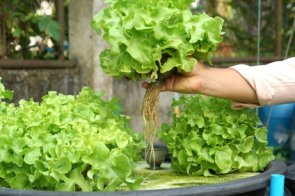
FAQ: What’s the Difference Between Aquaponics and Hydroponics?
When talking to students and educating the public about the benefits of aquaponics, one of the most common questions is: “What is the difference between aquaponics and hydroponics?” This is a very good question with the easiest answer being “fish”, but the truth is that the difference goes much deeper (no pun intended) than swimming fish. The reason being that aquaponics is 100% organic and does not require the hydroponic solutions and additives that are necessary to operate a hydroponic system successfully.
Both aquaponics and hydroponics are considered hydroculture gardening techniques (soilless gardening). Both methods use nutrient-rich water to bathe the plants’ roots, and it has been reported that plants demonstrate better growth rates compared to conventional soil-based growing. “Hydro” derives its name from the Greek word “hudor” (water) and “ponics” is derived from the Greek word “ponos” (labor). Simply replace “hydro” with “aqua”, and you have the addition of aquaculture (fish farming).
What does this mean for farmers? It means that they now have the benefit of farming vegetables and greens, along with raising fish, and instead of adding fertilizers to the water to provide nutrients (hydroponics), fish are grown simultaneously in the aquatic environment to create a symbiotic relationship - The fish provide a natural source of organic nutrients through their excreted waste, and beneficial microbes convert the waste into a usable nutrient sources for the plants. In turn, the plants provide benefits to the fish as they naturally filter the water, resulting in a clean environment for the fish to live.
To simplify the distinctions further and provide a greater understanding of the two methods for growing greens, here is a look at some of the differences between hydroponics and aquaponics.
Ecosystem - An ecosystem is a biological community of interacting organisms and their physical environment. While hydroponics requires a sterile environment and cannot be considered an ecosystem, aquaponics can be considered an ecosystem due to the interaction and reliance between plants, fish and microbes.
Expenses – As previously mentioned, hydroponic systems require the addition of chemical nutrients to feed plants; this can become quite costly and is certainly more expensive than the fish feed required for aquaponic systems.
pH - When running any aquatic-based growing system, understanding and controlling pH is an essential part of the process. In hydroponics, the optimum solution pH is 5.5 to 6.0, and in aquaponics, pH needs to be neutral or only slightly acidic (optimal level between 6.8 and 7.0) in order to safely raise fish.
Water Use and Waste – In hydroponic systems, water needs to be unloaded because of the build-up of salts and chemicals which can reach levels that may become toxic to plants; this results in waste water that must be discarded. On the other hand, in an aquaponic system water does not need to be replaced; rather, growers just add water as needed to maintain water levels that may drop due to evaporation.
Disease - The fungal disease Pythium (aka root rot) is a common problem in hydroponic systems. While a lower water temperature and sterile environment can help decrease the rate of incidence, it does not eliminate it completely. On the other hand, in aquaponics Pythium is practically nonexistent due to the microbes in the system.
Organic – Aquaponics offers security in knowing that what you are growing is organic; if any chemicals were to be added to an aquaponic system, the fish would perish. While aquaponics is somewhat of a replication of a natural ecosystem, hydroponics is designed within a sterile man-made environment. As previously mentioned, hydroponics requires the use of costly nutrients to feed plants; in aquaponics, plant nutrients are derived from the conversion of solid fish waste by bacteria and composting worms.
Aquaponics, and specifically AquaGrove’s Learn and Grow system, can offer benefits that go far beyond organic and sustainable gardening. With a closed-loop system that requires very little space (5.5’ x 7’) and can withstand various climates, AquaGrove can turn almost any space, room or classroom into a green space that teaches the next generation the importance of sustainable living, water conservation and food security.
To learn about how you can benefit from aquaponic gardening, contact AquaGrove.
